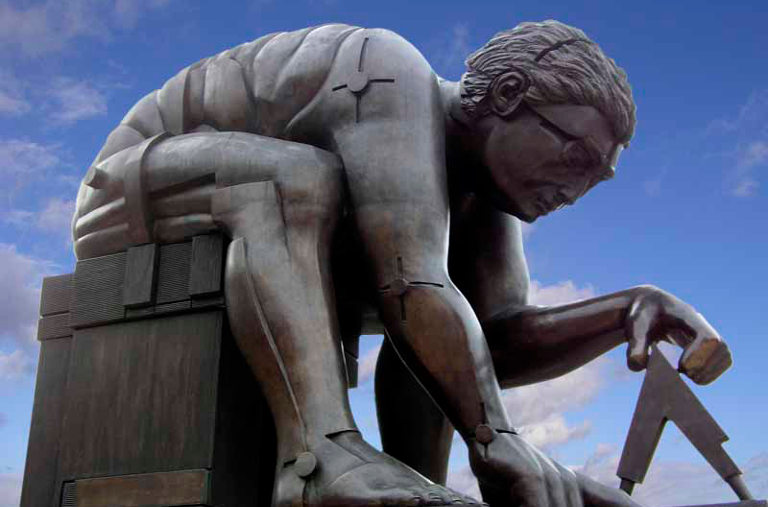A friend of mine quipped that it is one thing to talk about the end of modernism—as the two of us have been doing for over 25 years—and quite another to live through it. It might seem that such notions are far too abstract to account for the anxiety of our fraught times. But underneath all the disorder we see in our pandemic-plagued economic, social and political lives is the crumbling of key assumptions about what we call modernity, a period of “enlightenment” that has supposedly freed us from the past.
First, let me recount what I regard as four key assumptions of modernism—I’ve written about them before—which are being demolished every day right before our eyes with the help of an invisible virus.
- Humans are in one category and nature is in another.
- Scale doesn’t matter.
- History can be safely ignored since modern society has seen through the delusions of the past.
- Science is a unified, coherent field that explains the rational principles by which we can manage the physical world.
The next thing I need to remind you is that modernism is as much a religion as any other. In the not-too-distant past, whenever anyone raised questions about its basic tenets—directly or indirectly in one form or another—that person was quickly shushed. If the person persisted, he or she was then shamed. If shaming didn’t work, then that person was shunned or even unceremoniously ejected from the party.
Enter COVID-19.
The very first thing COVID-19 reminded us is that humans and nature are both in the same category, whatever you want to call it. (My favorite living French thinker Bruno Latour proposed the compound term “nature-culture” in his seminal book We Have Never Been Modern.) We are in this dance of existence together, forever part of one continuum that I sometimes call “the all” (a term that, not surprisingly, has gotten zero traction). The universe we live in is seamless. No one has been able to show me where the universe stops, has a gap, and then starts up again.
From an ecological viewpoint this realization has enormous implications. Climate change is yet another phenomenon which cannot be explained unless we collapse the two categories of humans and nature into one.
As for the second tenet, scale doesn’t matter, the pandemic has shown all too well that the scale of our transportation system and the scale of our cities and the scope of their connections took COVID-19 around the world in just a few months. No place has been untouched. And once again, climate change demonstrates that the scale of our industry does matter. That scale is leading to profound changes in the Earth’s climate.
The techno-uptopians and their economist allies imagine that the global economy in 2050 will be more than twice the size it was as of 2016. They do not imagine for a minute that it could be smaller or the same. They do not believe that successfully doubling the scale of our current intrusion on natural systems, or at least trying to, will destabilize those systems to such an extent that economic growth will not be possible and may even reverse. In short, they cannot imagine limits on the scale of human endeavors. And yet, those limits are being manifested all around us.
As for history being ignored, we have done that particularly well during the pandemic, but at great cost. The same fights over wearing masks took place in the 1918-19 Spanish flu pandemic. And, some officials thought it best to downplay the seriousness of the epidemic. Back then each of the warring powers in the First World War thought publicly acknowledging the pandemic would undermine their own war effort by sapping morale and alerting enemies to a vulnerability.
The health commissioner of New York City, Royal Copeland, threaded the needle with an approach that called for such measures as social distancing, masks and staggering starting times for public events such as Broadway shows to reduce crowding in the streets. So long as theaters refused to allow admittance to obviously ill patrons, their productions were allowed and afforded an opportunity for Copeland and his team of public health workers and volunteers to educate the audiences through brief lectures before performances about how the flu was spread and how to stop that spread. Workplace hours were staggered as well to prevent crowding on public transit.
Copeland even kept schools open, reasoning that because better public health measures could be afforded children in schools, they would be far better off than in the conditions that prevailed in most of the residences in a city filled with poorly maintained tenement houses.
Whatever your view of the current measures adopted to fight the COVID-19 pandemic, the lessons of history have not been studied and seem lost on us. Many countries have wagered everything on a vaccine instead of preparing for the long and possibly yearly seasonal confrontation with this virus.
Finally, we have learned at our peril that science is anything but unified. Generally, fights within the medical profession about treatment for various diseases have been little noticed by the public—until now. Suddenly, these fights have broken out into the public eye and are reported on a daily basis. In that reporting we find that COVID-19 is like no virus we have seen: It’s a respiratory virus. No, it can also affect the internal organs including the heart. Wait! It can affect the brain, too. No wait, it is also a vascular disease. And this does not count the psychological toll of the pandemic that is leading to increased mental illness.
One thing is certain. The modern medical establishment has conflicting and sparse ideas about how to help someone who has a severe case of COVID-19 infection.
And yet, alternatives are ridiculed; some, of course, with good reason. But certainly the idea of a unified science that can give us definitive and rational answers for every problem has been shattered. Science, it turns outs, is a process not an answer. And, it usually has many answers from various sciences, each having their own methods and standards. When someone tells you, “the science says,” be skeptical. They are usually being paid to say what they are about to say or at least have been thoroughly indoctrinated by others who are paid. There is never just one answer to any supposedly scientific question.
All of our institutions are being called into question. In part, that’s because they operate based on the four tenets listed above. Now that those tenets can no longer be sustained, we are at sea as a society. What can we believe in? What bedrock principles can we find for the world that is emerging around us?
I believe we must start by trusting our experience over the reductionist concepts we are fed by our leaders in practically every field. These concepts are often characterized by the notion that “the world is nothing but” and then the speaker fills in the blank with such phrases as “atoms and molecules” or “a competitive arena where only the fittest survive” or some other reductive nonsense.
It is true that our experience can be misinterpreted. But we can soon correct that misinterpretation as experience teaches us more. And, if we include a principle that says we have to honor the experiences of others, we have a beginning. Of course, we need to keep in mind that to honor others’ experience we are obliged NOT to usurp their autonomy.
Broad concepts that are forced on whole societies can have hugely negative effects precisely because experience tells us that one size NEVER fits all and often very badly fits many. I need only cite the four tenets of modernism above.
Modernism is dying. More and more people are losing faith in it because it was always a faith. We can choose to replace it with more concepts, new or old, or we can fashion an open-ended system that focuses closely on our experience and adjusts as our experience tells us—all without seeking some ideological straitjacket that once again divorces us from our essential human reality, experience.
Photo:
Bronze sculpture outside the British Library in London. Inscription reads: ‘NEWTON’ after William Blake by Eduardo Paolozzi 1995. Photo by John McCullough (2003).Via Wikimedia Commons
https://commons.wikimedia.org/wiki/File:Newton_by_Eduardo_Paolozzi_2003-03-10.jpg






